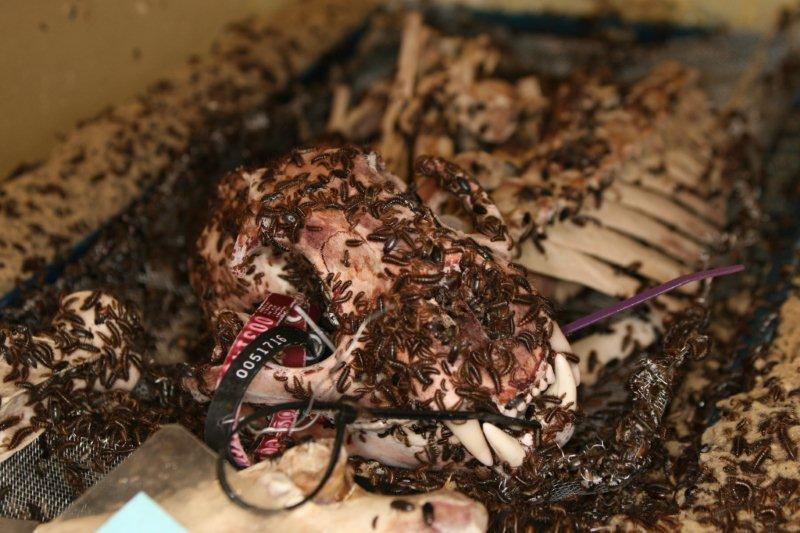From saunas to flesh-eating bugs: great long reads of 2021
The region has historically sat on the fringes of the nation, long imagined as an isolated, tropical wasteland of little economic or cultural value.His revealing piece explores how gay men there are claiming spaces and building communities in their own secret worlds.2021 was also a year dominated by the climate crisis.

- Country:
- United Kingdom
The year began with robots and ended with seances – well, it did on the Insights’ desk anyway. The Conversation’s long-form series is all about variety, and that is certainly what 2021 brought.
Our authors have been researching the world on a massive range of topics. Whether they are experts in flesh-eating beetles or climate change, anthropologists studying loneliness, or historians uncovering the hidden narratives that have shaped our present – they all have one thing in common: they know how to tell a story.
Some took us on the intensely personal research journey of the author and reflected the suffering that COVID had wrought in 2021.
Others were surprising and hopeful, not to mention intricately detailed and vigorously researched. Here are some of our personal highlights.
Medical science historian, Matthew Eddy, recounted the amazing story of James McCune Smith – the first African American physician known to have been published in a British medical journal and an indomitable abolitionist. Eddy’s story traces McCune Smith’s move from New York to Glasgow where he studied medicine and his efforts to expose the harmful drug trials being carried out by a senior white professor who was experimenting on vulnerable women. The piece shines a light on a very important, but little-known, event in British history.
It’s difficult for many people to imagine what life will be like in old age. But one of the main worries about aging is whether or not we will have someone by our side to help us navigate those difficult years. COVID-19 and lockdown brought the longstanding issue of loneliness and isolation in the lives of older people back into the public consciousness. A new study delved into what that kind of isolation is really like.
The Loneliness Project – a large-scale, in-depth exploration of how older people experience loneliness and what it means for them – generated over 130 hours of conversations. These honest and moving discussions were brought to life by researchers Sam Carr and Chao Fang.
They discovered that loss, physical deterioration, biographical pain and regret all give rise to a unique sense of disconnection from the world. As Sam says, “Loneliness in later life runs deep – much deeper than we might think.” Back in 2009-10, James Cummings spent 12 months studying Mandarin Chinese in Hainan and made friends in local gay communities. Inspired by those experiences, he spent eight years researching with gay men in the region and, in 2018, completed a Ph.D. thesis exploring gay lives in Hainan. He wanted to find out how gay lives are lived on the margins of global LGBT politics and activism, away from cities imagined as cosmopolitan centers of modernity.
Hainan lies in the Gulf of Tonkin, 30km off the southern coast of mainland China. The region has historically sat on the fringes of the nation, long imagined as an isolated, tropical wasteland of little economic or cultural value.
His revealing piece explores how gay men there are claiming spaces and building communities in their secret worlds.
2021 was also a year dominated by the climate crisis. There were roaring fires from Canada to California to Greece, devastating floods in Germany and China, and all the while greenhouse gas emissions surged back after the blip induced by 2020’s lockdowns. November saw the 26th UN climate change summit, COP26, which yielded mixed results and a lot of hot air over so-called “net zero” policies.
Net-zero, it seems, has become the litmus test for gauging how serious a country (or company, or person) is about tackling the uncertain and damaging consequences of global heating. But concerns have been mounting that net-zero itself isn’t fit for purpose. This was the assertion made by three top climate scientists in an article we published last April in collaboration with Apple News editors.
In the authors’ view, there is a dangerous problem with the concept at the heart of global climate policy. These scientists – including a former chair of the Intergovernmental Panel on Climate Change – argued that for decades, the concept of net-zero has held back effective action and even encouraged further burning of fossil fuels. And many are of the view that it continues to do so.
For something a bit less unremittingly depressing, dive into the world of “wireheading”. This refers to a kind of behavioral loop that both stereotypical drug addicts and AIs get stuck in, where the reward is sought at the cost of other goals. This phenomenon is quickly becoming a hot topic in the machine learning community and those concerned with AI safety.
The story was written by two experts – one with a background in computational neuroscience and the other a historian. It’s a rollicking read covering the hunt for the pleasure center of the brain, cocaine rat experiments, fears about video games, and an AI-run future.
And perhaps my personal favorite story from the year – and one that I’ll be taking to heart over the Christmas period – is a story about the health benefits of saunas and hot baths. It turns out that regularly bathing in hot water or an even hotter room can elicit some of the same physiological responses as going for a run. Cheers to that!
(This story has not been edited by Devdiscourse staff and is auto-generated from a syndicated feed.)










